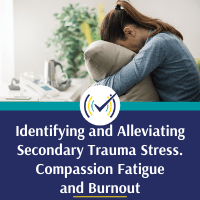This course does not offer CE Credits. The same course is available for purchase and offers 3 CE hours for behavioral health clinicians. See "related products" below.
Secondary traumatic stress (STS) and compassion fatigue (CF) are commonly assessed in the field of emergency and mental health as well as in the study of best practices for clinicians and front-line workers in the field of trauma. The unimaginable state of global crisis has placed these constructs under the spotlight as first responders, front-line medical personnel, and mental health professionals work with traumatized patients and clients while experiencing their own level of physical, emotional, and psychological stressors. As levels of empathy and compassion grow in the hearts of front-line workers caring for those in distress, so does the cost; leading to a state of physical, emotional and psychological exhaustion.
It is imperative to identify vulnerabilities to and symptoms of STS and CF along with practical and effective ways to mitigate symptoms and prevent secondary or vicarious trauma and burnout. Equally important are skills to build resiliency as well as compassion satisfaction in order to best combat the inevitable and universal layer of STS.
This is a non-interactive self-study course.
Instruction consists of 3 hours of video instruction and an evaluation.
Learning Objectives:
- List symptoms and identify the differences and similarities of secondary traumatic stress STS, compassion fatigue CF, burnout BO, and vicarious trauma VT.
- Recognize personal and professional vulnerabilities to secondary traumatic stress and compassion fatigue.
- Develop interventions useful via Telemental health in working with those who are experiencing STS, CF, and BO.
From the time of registration, you have six months to access the coursework.
Vanessa Snyder, PhD, is the Vice President of the Richmont Institute for Trauma & Recovery and is an Assistant Professor at Richmont Graduate University. She spearheaded the launch of the Richmont Trauma Center and now directs all clinical services. She is a practicing Licensed Marriage and Family Therapist and a Licensed Professional Counselor. She is also an AAMFT Approved Supervisor, Approved Clinical Supervisor, Certified Sex Therapist, Certified Master Traumatologist, and Certified Anger Management Specialist. Clinically, she specializes in treatment of trauma, complex trauma, and dissociative disorders.
Dan Sartor, PhD, LPC, NCC is the Vice President of Integration and Professor of Counseling at Richmont Graduate University in Atlanta, GA. He is a Licensed Clinical Psychologist (IL & GA), Licensed Clinical Professional Counselor (IL), and Nationally Board Certified Counselor. In addition to addressing issues of depression, anxiety, and grief in psychotherapy, Dan’s clinical specialties include complex trauma recovery, sexuality issues, addiction recovery, marital therapy, and the integration of Christian faith with clinical practice.
This course does not offer CE credits, just great content.
The same course is available for purchase and offers 3 CE hours for behavioral health clinicians. See "related products" below.
Participants may request a printed version of their certificate of attendance to be delivered by mail. A shipping/handling fee of $6.95 will be charged per request. Shipping internationally may require an additional charge.
This is a non-interactive, self-study course.
To receive your certificate of attendance you must complete the course in its entirety.
To complete a Training Video Course, one must register, log in, select the My Courses option from the menu items, click the Course Title, attend to the video content, and complete the course evaluation, then claim the certificate of attendance.
You can download or print your certificate of attendance by logging into your account, navigating to the course by selecting the My Courses option from the menu items, clicking the Course Title, scrolling to the Certificate of Attendance section, and clicking on the Certificate of Attendance link to either download it or print it.
Participants may request a printed version of their certificate of attendance to be delivered by mail. A shipping/handling fee of $6.95 will be charged per request. Shipping internationally may require an additional charge.
Directions for completing a course can be found by clicking here.
This course is intended for clinicians who provide behavioral health services.
This is a non-interactive, self-study course. Teaching methods for this course include recorded lectures, videos, and a course evaluation.
This course was recorded 5/18/2020



